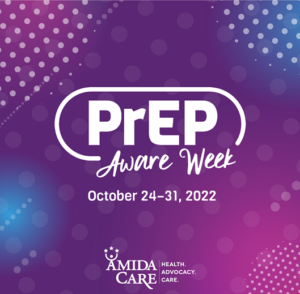PrEP Aware Week 2022: The Battle for Accessibility and Uptake is Far from Over

PrEP Aware Week 2022 in New York State runs from October 24 through October 31, a time for all New Yorkers to learn about and access PrEP (pre-exposure prophylaxis) treatment, which can reduce the risk of getting HIV through sex by 99%. PrEP usage is critical to getting back on track in ending the epidemic in New York, especially among populations most deeply affected by HIV—particularly Black and Hispanic youth, women of color and LGBTQ+ communities, including transgender women.
2022 marks the 10-year anniversary since PrEP was first approved by the FDA, which has been a game-changer in the decades-long fight to end the HIV/AIDS endemic. Though PrEP usage has steadily increased, disparities and underutilization remain. The Centers for Disease Control and Prevention (CDC) estimates that 1.2 million people in the U.S. would benefit from PrEP, though less than 25% of this population were taking it in 2020, according to the U.S. Department of Health & Human Services.
Sadly, structural racism, homophobia and transphobia have created racial, social and ethnic disparities that prevent access to care and trust in healthcare entities.
- Black and Hispanic/Latinx people account for the majority of those for whom PrEP is recommended, but they have the lowest rates of PrEP use among all racial/ethnic groups.
- Though a recent CDC study found that four in 10 transgender women in seven major U.S. cities are living with HIV, another survey showed that only 32% of HIV-negative trans women reported using PrEP.
- In 2018, cisgender women represented 1 in 5 new HIV diagnoses in the U.S., 58% of whom were Black/African American and 18% of whom were Latinx; currently, only 10% of women who could benefit from PrEP were prescribed it, and only 20 to 30% of women are even aware of it.
- Stigma has played a persistent role in preventing many populations from using PrEP.
In December 2021, the FDA approved the first long-acting injectable for PrEP, which has the potential to be highly effective. However, equitable access is a challenge, as the price is high, especially compared with current medication.
So far, due to issues of access, insurance, awareness and stigma, PrEP has mainly benefited white men in large cities. To ensure equity, which is crucial to ending the epidemic once and for all, Congress must fund a national PrEP program and leverage the cost savings power brought about by generic competition.
Additionally, anything we can do to lessen the damage of social determinants such as structural racism, homophobia and transphobia will help ensure PrEP access and usage in communities that need it the most. In order to drive progress to end the HIV/AIDS endemic by 2030, we must ensure that no one is left behind.
Actionable Solutions:
- Promote health equity and practices that address health disparities and stigma.
- Promote services that are responsive to the lived experiences, trauma, and stigma that disproportionately affect communities of color, indigenous populations, LGBTQ communities, and transgender and gender non-conforming individuals.
- Partner and collaborate with key stakeholders, such as policymakers, government officials, service providers, community partners, consumers, and research entities, to address social determinants of health, such as poverty, education, employment, and access to insurance coverage.
PrEP Resources:
- New York State Department of Health (NYSDOH) AIDS Institute – PrEP for Sex
- Callen-Lorde Community Health Center – PrEP
- Harlem United – Is PrEP for You?
- CDC PrEP page
- PleasePrEPMe – PrEP for Women
- PleasePrEPMe – PrEP for Trans Women
- The Stigma Project – Is PrEP Right For Me?
- NYSDOH – PrEP Yourself Against HIV brochure (English, Spanish, simplified Chinese, and additional languages)
- PrEPFacts.org Virtual Library (English and Spanish)
- New York City (NYC) Health – PrEP Provider FAQs
- NYC Health – PrEP and PEP: Information for Medical Providers
- HIV Clinical Resource – New York State Guidelines for Use of PrEP
